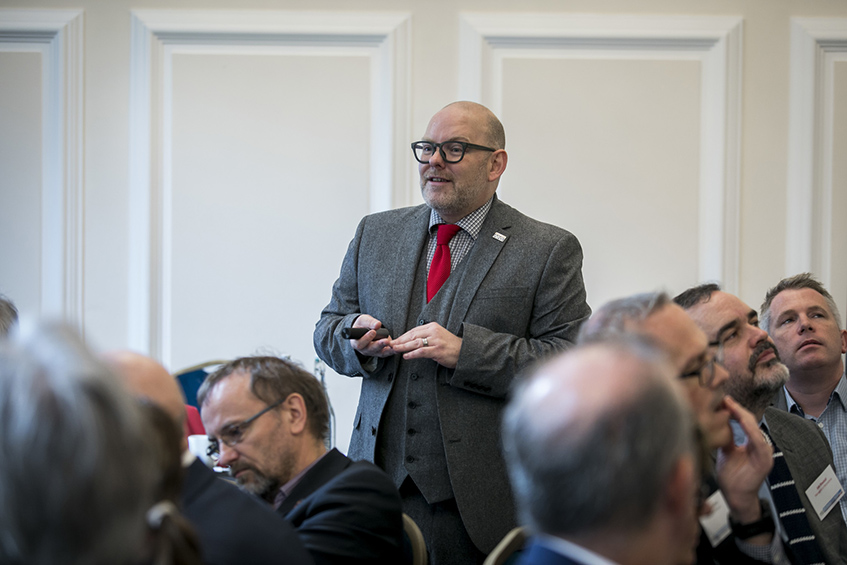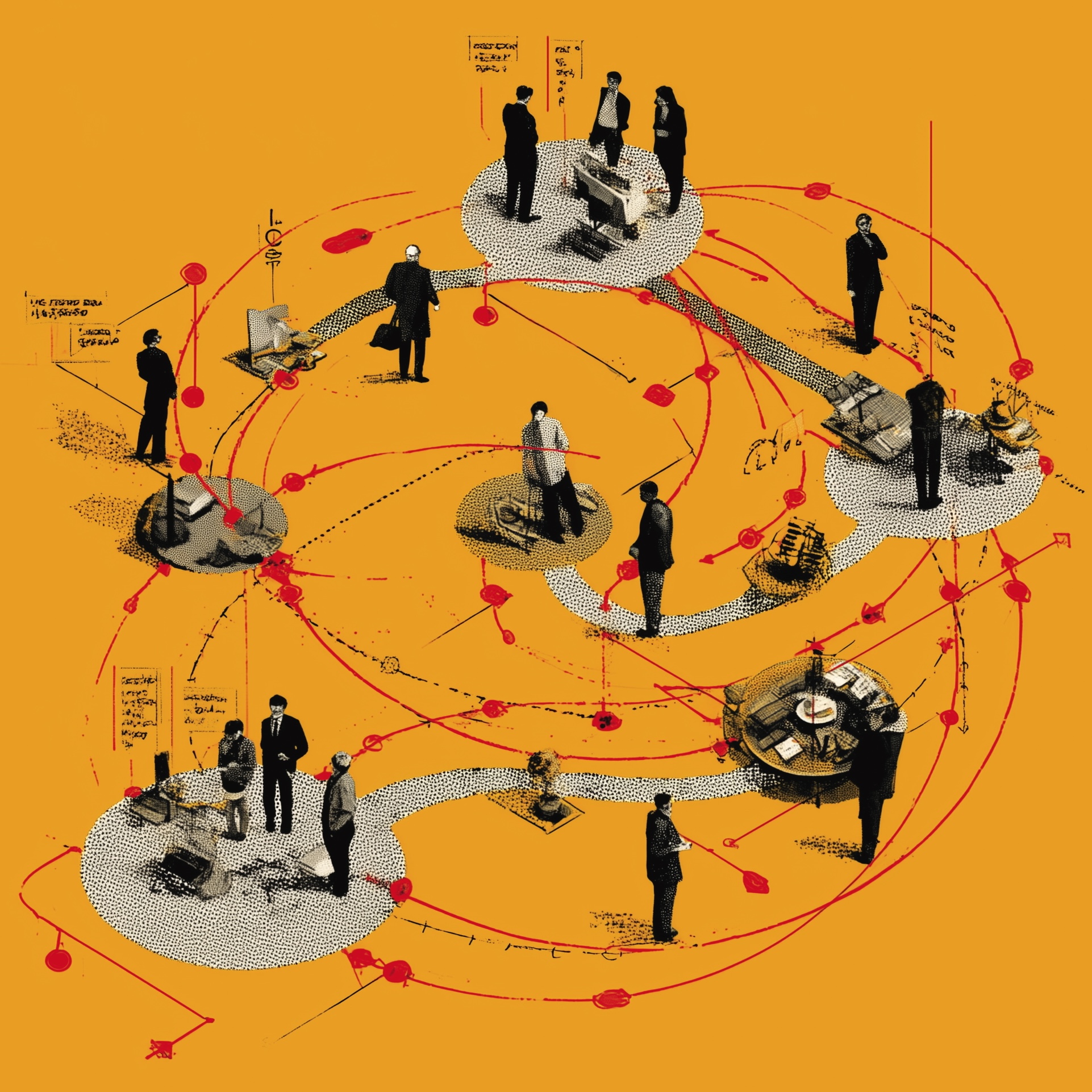Managers need hope and purpose
Following the union’s successful Summit, MiP wants to challenge the denigration of NHS management and create a hopeful and compelling story that shows the true value of what health and care managers do.

At MiP’s Summit in October 2017, a group of MiP members got together to talk about developing a more positive and hopeful story about NHS management. It was a difficult but revealing discussion. MiP chief executive , who sat in on the session, says the 20-odd managers in the room had no illusions about how they were seen: “People realised that they are seen as bullies or just in it for the money or on the take – even corrupt in some senses; that people think they are interfering, controlling and taking clinical decisions.”
Several managers described how they, or their relatives and friends, were embarrassed to talk about their job, while others admitted hiding behind their previous professional status as a nurse or chiropodist to avoid telling people they had become a senior manager.
“I’ve heard a lot of heart-rending stories recently about how people basically lie about being an NHS manager,” says Restell. “These are people who are trying to manage very difficult decisions and situations and I think they just don’t deserve that at all. It’s a heroic performance. And every time I hear them, I just come away thinking: ‘you really are worth fighting for – the job you’re doing is absolutely essential and we have to find a way to get that across to people’.”
In his speech to the Summit later in the day, former NHS Employers chief executive Dean Royles won sustained applause when he said it was time for managers to stop apologising and talk up their achievements in the NHS. “Grey suits and uncaring bureaucrats is how NHS managers are portrayed, and I’m sick of it,” he told delegates. “It’s our job and the job of representative organisations like MiP to not only deny that view, but through our actions to refute that view. To stand up and challenge it every time we hear it.”
While managers often find it easy to list the individual things they achieve and how they contribute to better patient care, both managers and managers’ organisations often find it difficult to sum up, in simple, clear terms, what managers bring to the table.
“I think we’re so busy explaining how we’re not as worthy as doctors and nurses and frontline staff that we then fail to create the right kind of language and positivity,” says Restell. “And I think that’s why Dean’s speech went down so well – because people were buoyed by it and felt their worth, their value and their skills were being acknowledged publicly, without apology or qualification.”
Even among those who appreciate the work managers do, there seems to be a kind of “block” on seeing management itself in a positive light, Restell suggests. All too often, this means popular and widely-supported initiatives get spun negatively when it comes to implementation – so health and social care integration, for example, becomes associated with cuts and service closures as soon as managers get involved.
Even managers themselves are often defensive about what they do. “There’s a feeling that it’s best not to draw attention to ourselves as managers because all we get is negativity,” Royles tells Healthcare Manager. “People feel defeated by it – they know if they thank managers on Twitter for doing something, someone will come back saying it would be better if we had more nurses and fewer managers, so they just keep quiet about it.”
Royles, now director of HR and organisational development at Leeds Teaching Hospitals, describes how his trust has just completed a programme which vaccinated more than 12,000 staff against flu. “Of course, we put messages out thanking the fantastic and dedicated clinical staff, but we didn’t particularly talk about the fantastic planning and management that went into making it happen. We’ve got to start saying publicly that these things take management skill and dedicated administrative staff.”
Denigration of management
The denigration of management in the NHS is, in many ways, fantastically unusual. You don’t see it in private healthcare companies, for example, and in most other sectors getting a management job is a reason for congratulation, not feelings of shame. But NHS managers are in a totally different situation to their counterparts in the private sector – juggling many competing priorities in a highly-politicised environment, and operating in an often unhealthy culture they feel powerless to change. And in terms of values, it’s arguable that NHS managers have more in common with doctors and nurses than with mangers in, say, the oil industry or financial services.
“Managers are the lightening rod between politicians and clinical staff – and when things go wrong it’s quite easy to blame it on managers generically and call for management heads to roll,” Royles explains. At the same time, the pressure on managers to focus on meeting budgets and targets for their own sake, rather than the stable organisations and better patient care they’re designed to achieve, “suggests managers’ work runs counter to what’s good for patients”, he warns.
“When we’re talking about our financial or organisational performance we’re really talking about improving services to patients,” Royles adds. “How do you know you’re achieving that? Because you can track some indicators that help you see that. But as soon as you do that, they call you a bean counter.”
Restell says many managers simply can’t manage as they want or as their clinical colleagues expect. “I think people want to be coaching and empowering, they want to integrate services and make improvements, but they find themselves in cultures and situations that make that very difficult. If people are constantly shouting at you for figures and about targets you can’t meet, how can you carve out even an hour to spend with someone who’s struggling and needs support?”
Workplace culture
But managers can’t escape some responsibility for the workplace culture within teams, organisations or the NHS as a whole, warns , the assistant director of organisational development at NHS Employers, who facilitated the MiP Summit workshop. “It’s a bit like saying ‘I’m going to be late because I’m stuck in traffic’, when you are the traffic… You’re not stuck in the culture, you are the culture,” he says.
Taylor-Pitt describes workplace culture “as the vehicle for an organisation to deliver on its promises.” This culture isn’t set by the board or by corporate policies, he argues, but by “conversations in the kitchen and in the car on the way home… by the people who are working with patients every day – it happens everywhere”. Managers need to take the chance to shape their own culture, he says, “because no one is going to do it for us”.
Giving managers a clear and powerful role in shaping better workplace cultures in the NHS would go a long way towards giving managers a clearer sense of purpose that’s more widely appreciated by their clinical colleagues and the public.
But Royles warns that managers and even organisations are not entirely free to set their own culture. “The regulatory system is actually setting that culture as well,” he says. “How NHS Improvement, NHS England, Health Education England, Public Health England and CQC relate to each other and behave plays a a huge part in setting the tone for how the system as a whole operates.
“If you feel as though you’re constantly under threat, constantly under scrutiny, and you feel fearful, that has an impact,” he adds. “You can’t just say to people, ‘well, what have you done for the culture?’ when you’ve got things like that happening.”
Join our workshop in 2018
To start to get to grips with these issues, and to begin to build confidence among NHS managers, MiP is planning a workshop for members and system leaders in 2018. “I think the time for being apologetic and defensive about NHS management is over,” says MiP’s Jon Restell. “We need to have another go at creating a positive narrative and language for NHS management. And we need a much clearer set of professional values and skills for managers.

“It needs to be properly inspiring, it needs to be unapologetic and it’s got to avoid the kind of defensive humility which I think we see too much of now,” he adds. “Either you’ve got an important job that’s worth £75,000 a year from the taxpayer, or you haven’t – and if you have, we need to be able to tell people why it’s important, in clear terms that everyone can understand.”
Taylor-Pitt talks about setting out a “vision” for NHS management – something that makes a clear link between being an excellent manager and making a difference on the ground. “You need something ambitious to work towards, something that’s bigger than you. Visions aren’t always tangible, sometimes they’re not even achievable, but they’re something to strive towards other than metrics and targets.”
Restell and Taylor-Pitt agree that the relentless focus on leadership in recent years has taken attention away from the important work managers do day-in-day-out to develop staff, manage budgets and run patient services.
“There’s a growing body of academic opinion saying that chief execs should be doing less visioning and strategy, and be more focussed on execution, relationships, and building the morale and capacity of people to deliver,” says Restell. “Re-designating managers as leaders can seem like another way of erasing the manager’s identity.”
“I know a tax inspector who tells people that his job is building hospitals and schools,” he adds. “That might seem a bit ridiculous, but it’s a way to get people to focus on the real value of the job, rather than processes or stereotypes. That’s the kind of thing we’re looking for.”
Related News
-

NHS job cuts: you’ll never walk alone
As the NHS redundancies in England loom, Rhys McKenzie explains how MiP will back you, and how members supporting each other and acting collectively is the best way to navigate this difficult process.
-

What now? Seven expert takes on the Ten-Year Plan
The government’s Ten-Year Plan for the NHS in England has met with enthusiasm and exasperation in equal measure. We asked seven healthcare experts to give us their considered view on one aspect that interests, excites or annoys them.
-

NHS job cuts: what are your options?
When politicians start reforming the NHS, there is only one certainty: some people will lose their jobs. But what options might be on the table and how does redundancy work? Corrado Valle explains.